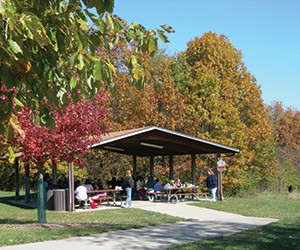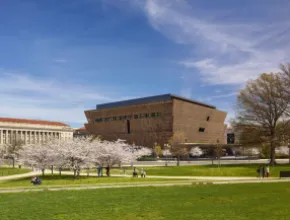Farming has been a way of life in Central Illinois for 200 years, but these days the country’s most productive farmland is growing for the future.
Farm-to-table restaurants, cutting-edge agricultural research facilities, pioneering green practices and hands-on farm tours yield a bumper crop of off-site venues and group activities.
Even the most citified group can appreciate the satisfaction of planting a seed–whether a project, a business or an actual seed–and watching it grow to fruition. While not everyone farms, everyone eats, and everyone learns.
Champaign/Urbana
Rooted in history and reaching for tomorrow, the University of Illinois has long been a hub for progress in food production.
“We encourage groups to ‘play in our dirt’,” says Cory Hatfield, sales and sports director for Visit Champaign County. “With over 577,000 acres of farmland, the richest soil in the country, a leading research university and countless educational opportunities, discovering our rich agricultural history is a must for visiting groups.”
Through the bureau’s award-winning AgriTours Illinois program, planners can arrange extensive tours of the prestigious agricultural academic facilities at the University of Illinois. As many as 50 can visit the round barns at the Experimental Dairy Farm Historic District, tour the College of Agriculture, Consumer and Environmental Sciences (known as ACES), and see the Morrow Plots, a National Historic Landmark.
The I Hotel & Conference Center is located in the University of Illinois Research Park, which is home to major agriculture technology companies, including ADM Sustainable Bioenergy Modeling Center, Agricultural Informatics, the Caterpillar Simulation Center and John Deere Robotics. Groups as large as 50 can arrange tours and demonstrations at research facilities in the park. The adjacent 38,000-square-foot conference center introduced an eco-friendly living roof in 2012.
Prairie Fruits Farm & Creamery invite groups of approximately 50 to explore its goat farm and artisan cheesemaking facility. Tours last 1.5 hours and can include locavore boxed lunches.
There is private dining space for banquets as large as 100 along with the finest locally-sourced cuisine–including bison–at Big Grove Tavern. The farm-to-table favorite opened in Downtown Champaign in 2012. PageBreak
Bloomington/Normal
The business climate in McLean County is as conducive to growth as its dark loam soil. State Farm Insurance, founded by a retired farmer and now a Fortune 500 company, is headquartered in Bloomington.
“The most fun way for groups to incorporate the area’s agricultural heritage into events is to schedule time to explore the area,” says Amanda Borden, communications and tourism marketing manager at the Bloomington-Normal Area CVB. “We have several attractions that highlight our rich agricultural background–from Twin Groves Wind Farm to Rader Family Farm in the fall.”
The 360-acre Illinois State University Farm carries on research, education and demonstrations that provide a window into the future of agriculture. Located 18 miles northeast of Normal, the farm offers group tours for 50 or fewer.
Epiphany Farm brings food from farm to fork using “beyond organic” sustainable practices. Farm tours are available for as many as 20. Its restaurant Station Two Twenty, located in a 1902 firehouse in downtown Bloomington, offers banquet space for 160.
For six generations, Ropp Jersey Cheese Farm has been producing award-winning cheeses just a short drive from downtown Normal. Groups as large as 50 can enjoy hay rides and try their hand at milking a cow.
Twin Groves Wind Farm, located 16 miles east of Bloomington, harvests enough energy from the wind to power 120,000 homes. The facility welcomes groups of 25 to tour the facility, which includes 240 turbines spread across 20,000 acres of land.
Peoria
Pumpkins and popcorn play in Peoria–big-time. The area is the country’s largest producer of both. Lately, seasonal farm visits have become an attractive draw for event planners.
“Peoria has always been in the heart of the Midwest, surrounded by rich and fertile farmland, but only recently has the area begun to market its agricultural heritage to visiting groups,” says Sue Atherton, vice president of sales and marketing at the Peoria Area CVB. “More and more groups are looking for that real, authentic experience that so defines the farming communities in Central Illinois.”
Located near the riverfront, the Caterpillar Visitors Center offers self-guided tours of exhibits related to the company and its rugged machines for farming, mining and construction. Experience a ride in a mining truck, operate a machine simulator, or design new equipment in three dimensions. Special rates are available for groups of 25 or more.
A mouthwatering visit to Tanners Orchard allows groups to pick their own apples and sample apple cider, apple cider donuts and other treats from the bakery. Autumn brings covered wagon rides and a corn maze to explore. Tanners can welcome events as large as 100 in its Harvest Hall.
April through October, a tour of Linden Hills Farms allows groups of 10 or more to watch a fourth-generation family farm at work. Whether milking cows, feeding chickens, collecting eggs, watching lambs gambol or bottle-feeding calves, every tour sends visitors home with a smile and a better understanding of dairy farms in the Illinois River Valley.
Chef Josh Adam makes the most of locally sourced ingredients at his acclaimed farm-to-table restaurant, June. The menu changes daily, and private dining space is available for 12. PageBreak
Decatur
Every other year, Decatur is home to one of the largest agricultural exhibitions in the country, the Farm Progress Show. Constructed to house the show, Progress City, USA is an outdoor convention center that comprises 300 acres and can host nearly any size of group.
Macon County Conservation District preserves and protects both the country’s natural resources and historic farms, such as Homestead Prairie Farm. The district offers pavilions for 80 to 112 people in several park-like settings, and Rock Springs Nature Center has two conference rooms and a 100-seat auditorium.
Springfield
Home to the state fair and many historic sites, Springfield is the ideal place to learn about Illinois’ proud agricultural heritage.
“We have arranged visits to orchards, pumpkin patches, corn mazes and even Christmas tree farms,” says Terry Truman, sales manager at the Springfield CVB. “We serve as a local resource for speakers on a variety of agricultural topics. Because of our historical focus here, we also have great resources for heritage and native plant gardens that accommodate group tours.”
When it’s not hosting the state fair each August, the Illinois State Fairgrounds can accommodate groups of nearly any size on its 366-acre site. One of 29 buildings, the handsome Exposition Building was built in 1894 and offers a 34,800-square-foot main floor. The 39,000-square-foot Orr Building is perfect for trade shows.
Several local farms welcome group tours and special events. Twenty minutes from Springfield, The Farm offers 20 theme gardens, a variety of farm animals to view and event space for 50. Prairie’s Edge Farm in nearby Rochester offers hands-on tours for 25 or fewer that allow guests to collect eggs, feed pigs and wield pitchforks.
The oldest restaurant in Springfield, Maldaner’s is a leader in sustainable food production. It cultivates a rooftop garden, keeps its own beehives and boasts a Platinum Certification from the Green Business Network of Springfield. Maldaner’s can seat 120 for dinner or welcome 250 for receptions.
Kelly Crumrin is a regular contributor to Meetings Focus. She was born and raised in Central Illinois on a centennial family farm in Clark County.






